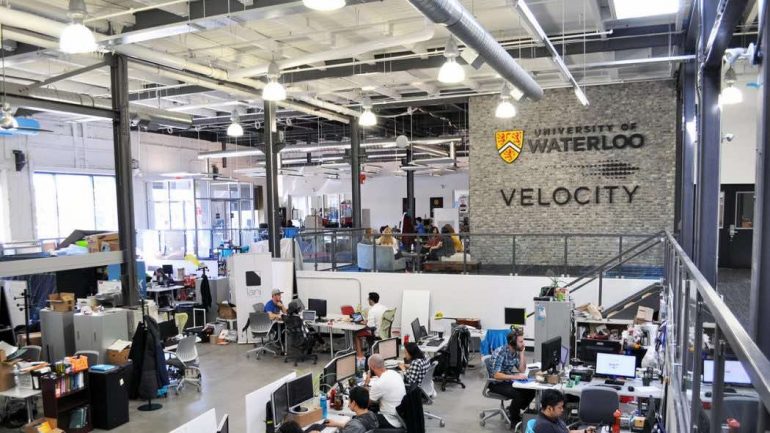The University of Waterloo-based incubator Velocity is set to get a new home following the recent announcement of a partnership between the City of Kitchener and the university to expand its downtown Health Sciences Campus.
On Monday, the City approved the development of a 90,000-square-foot university-owned warehouse that will be renovated to become an innovation centre for healthtech, as well as Velocity’s new home.
“What this means in terms of the new facility is now we can have purpose-built space to support product development.”
Velocity is expected to move into the new facility in early 2023. The move is a major one in Velocity’s evolution, which was founded in 2008 as a “dorm program” to help student entrepreneurs based at the University of Waterloo connect. Since then, Velocity has expanded into its current 37,000 square-foot space, located in The Tannery Building, which also houses Communitech and formerly Google’s local offices.
BetaKit spoke with Velocity’s executive director, Adrien Côté, about the new space and what it means for the incubator.
Côté called the move “the beginning of Velocity’s next era,” an optimization of the incubator’s existing programming, and a potential magnet for healthtech companies. While much of Velocity’s program is set to stay the same, the new facility will allow the incubator to provide more lab space for its companies.
Over the last number of years, Velocity has put increased focus on supporting deep tech and healthtech companies; startups that often need physical or lab space to develop products.
In 2019, Velocity reported that over the past six years the number of healthtech companies in its incubator increased, with more than one-third of companies in the sector. To support those startups Velocity reshaped some of its programming and in 2018 healthtech giant PerkinElmer moved its Canadian demonstration lab to Velocity’s space, giving startups access to a research lab. The incubator also launched the Velocity Health Tech Fund in March, focused on investing in medical devices, diagnostic tools, new therapies and digital health initiatives.
RELATED: Velocity announces winners of its first virtual pitch competition
“What [Velocity has] really done is created a full spectrum of resources and support for companies to really do product development, while we work with them on trying to drive their businesses forward,” said Côté.
“What this means in terms of the new facility is now we can have purpose-built space to support product development, all the way from chemistry and biotech labs, to electronics stations, and everything in between that’s required to build products for advanced technology,” he told BetaKit.
The new innovation building will include shared product development labs, as well as manufacturing and collaborative office spaces, in addition to space for Velocity companies to operate their businesses.
Côté told BetaKit while he expects Velocity’s programming to be fundamentally the same, it also allows for opportunities to reimagine how Velocity houses its companies, specifically pointing to the current shift to remote operations amid COVID-19.
“In terms of the office space, we might see a bit of a recalibration there in terms of if a company’s accessing the facility maybe there’s more hot-desking happening versus having a cluster arrangement for a particular team,” said Côté. “But fundamentally, it’s still going to be the formula of, ‘come work within Velocity, let us help you move your business ahead as fast as possible.’”
Amid the pandemic, Velocity has shifted much of its business development programming to virtual, as have many other incubator and accelerator programs. However, with its focus on deep and healthtech, Velocity has also kept its research lab open (government safety measures permitting) to allow its startups the much-needed space to develop products in-person.
The announcement of the new space for Velocity follows a year of significant changes for the incubator. In January, Jay Shah, who had served for three years and a half years as Velocity’s director, announced he was stepping down from the role.
RELATED: Velocity startups surpass $1 billion in total funding
The move followed a decision at the end of 2019 to restructure Velocity, with the launch of Concept, a pre-incubator campus program focused on student- and campus-focused initiatives. That also led to a change in Velocity’s executive structure, with Shah’s position divided into three separate roles: executive director of Velocity, director of Velocity Incubator, and director of student entrepreneurship.
Côté stepped in as Velocity’s executive structure in January, with John Cappuccitti serving as director of Velocity Incubator and Camelia Nunez the director of Concept. Concept is not set to take part in the move to the new innovation centre.
Overall, the development of the new centre is expected to cost $35 million. The City is set to provide up to $8.5 million, with the University of Waterloo dolling out $11.5 million. The university and the City are also hoping to source investments from the federal and provincial governments for the development of the space.
In addition to its capital investment, the City of Kitchener is also receiving approximately 5,000 square feet within the new space for health innovation programming and collaboration through the Waterloo Region Small Business Centre.
Image source University of Waterloo


